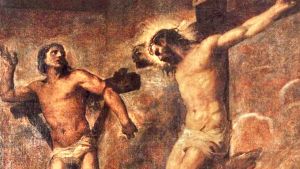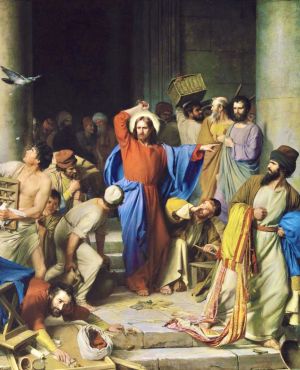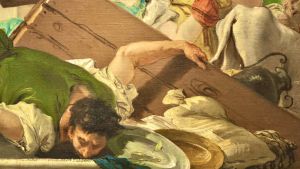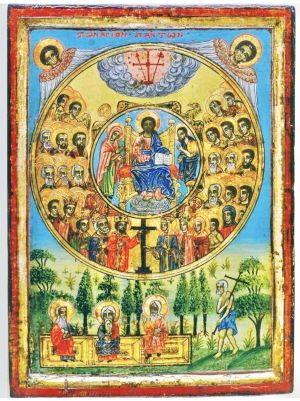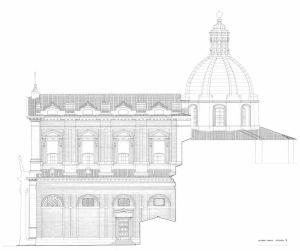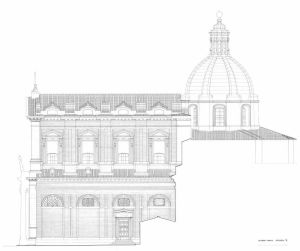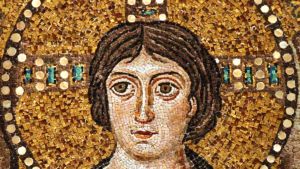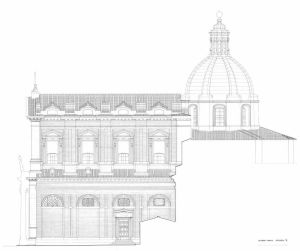
don Giuseppe Nespeca
Giuseppe Nespeca è architetto e sacerdote. Cultore della Sacra scrittura è autore della raccolta "Due Fuochi due Vie - Religione e Fede, Vangeli e Tao"; coautore del libro "Dialogo e Solstizio".
Christ the King: «Today with Me in the Paradise». Love and vinegar
Dedication of the Basilica of St. John Lateran [9 November 2025]
May God bless us and may the Virgin protect us! Let us be moved by Jesus' zeal for his Church, which he loves and wants to remain whole and faithful.
First Reading from the Book of Ezekiel (47:1-12)
Before rereading Ezekiel's vision, it is useful to recall the plan of the Temple that he knew, that of Solomon. Unlike our churches, the Temple was a large esplanade divided into courtyards: those of the pagans, of women and of men. The Temple itself had three parts: the open air with the altar of burnt offerings, the Vestibule, the Holy Place and the Holy of Holies. For Israel, the Temple was the centre of religious life: the only place of pilgrimage and sacrifice. Its destruction in 587 BC represented a total collapse, not only physical but also spiritual. The question was: would faith collapse with it? How could they survive after the destruction? Ezekiel, deported to Babylon in 597 BC, found himself on the banks of the Kebar River in Tel Aviv. During the twenty years of exile (ten before and ten after the destruction), he devoted all his energies to keeping the people's hope alive. He had to act on two fronts: to survive and to keep alive the hope of return. As a priest, he spoke mainly in terms of worship and visions, many of which concerned the Temple. Surviving meant understanding that the Temple was not the place of God's presence, but its sign. God was not among the ruins, but with his people on the Kebar. As Solomon said: 'The heavens themselves and the heavens of heavens cannot contain you! How much less this House that I have built!' (1 Kings 8:27). God is always in the midst of his people and does not abandon Israel: before, during and after the Temple, he is always in the midst of his people. Even in misfortune, faith deepens. The hope of return is firm because God is faithful and his promises remain valid. Ezekiel imagines the Temple of the future and describes abundant water flowing from the Temple towards the east, bringing life everywhere: the Dead Sea will no longer be dead, like the Paradise of Genesis (Genesis 1). This message tells his contemporaries: paradise is not behind us, but ahead of us; dreams of abundance and harmony will be realised. The reconstruction of the Temple, a few decades later, was perhaps the result of Ezekiel's stubborn hope. Perhaps in memory of Ezekiel and the hope he embodied, the capital of Israel is now called Tel Aviv, 'hill of spring'.
Responsorial Psalm 45/46
The liturgy of the Feast of Dedication offers only a division of Psalm 45/46, but it is useful to read it in its entirety. It is presented as a canticle of three stanzas separated by two refrains (vv. 8 and 12): 'The Lord of hosts is with us; our bulwark is the God of Jacob'. God, king of the world. First stanza: God's dominion over the cosmic elements (earth, sea, mountains). Second stanza: Jerusalem, "the city of God, the most holy dwelling place of the Most High" (v. 5). Third stanza: God's dominion over the nations and over the whole earth: "I rule the nations, I rule the earth". The refrain has a tone of victory and war: the Lord of the universe is with us.... The name 'Sabaoth' means 'Lord of hosts', a warrior title that at the beginning of biblical history referred to God as the head of the Israelite armies. Today it is interpreted as God of the universe, referring to the heavenly armies. The second verse is about the River. The evocation of a river in Jerusalem, which in reality does not exist, is surprising. The water supply was guaranteed by springs such as Gihon and Ain Roghel. The river is not real, but symbolic: it anticipates Ezekiel's prophecy of a miraculous river that will irrigate the entire region as far as the Dead Sea. Similarities can be found in Joel and Zechariah, where living waters flow from Jerusalem and bring life everywhere, showing God as king of all the earth. All the hyperbole in the Psalm anticipates the Day of God, the final victory over all the forces of evil. The warlike tone in the refrains and in the last verse ("Exalted among the nations, exalted on earth") means that God fights against war itself. The Kingdom of God will be established over the whole earth, over all peoples, and all wars will end. Jerusalem, the "City of Peace," symbolises this dream of harmony and prosperity. For some commentators, the River also represents the crowds that pass through Jerusalem during the great processions.
Second Reading from the First Letter of Saint Paul the Apostle to the Corinthians (3:9...17)
The deepest desire of the Old Testament was that God would be forever present among his people, establishing a kingdom of peace and justice. Ezekiel expresses this with the prophetic name of Jerusalem: 'The Lord is there'. However, the fulfilment of this promise exceeds all expectations: God himself becomes man in Jesus of Nazareth, 'the Word who became flesh and dwelt among us'. St Paul, rereading the Old Testament, recognises that the whole history of salvation converges towards Christ, the eternal centre of God's plan. When the time is fulfilled, God manifests his presence no longer in a place (the Temple of Jerusalem), but in a person: Jesus Christ, and in those who, through Baptism, are united to him. The Gospels show this mystery of God's new presence in various ways: the Presentation in the Temple, the tearing of the veil at the moment of Jesus' death, the water flowing from his side (the new Temple from which life flows), and the purification of the Temple. All these signs indicate that in Christ, God dwells definitively among men. After the Resurrection, God's presence continues in his people: the Holy Spirit dwells in believers. Paul affirms this forcefully: "You are the temple of God, and the Spirit of God dwells in you." This reality has a twofold dimension: Ecclesial: the community of believers is the new temple of God, built on Christ, the cornerstone. Everything must be done for the common good and to be a living sign of God's presence in the world. Personal: every baptised person is a "temple of the Holy Spirit." The human body is a holy place where God dwells, and for this reason it must be respected and cared for. The new Temple is not a material building, but a living reality, constantly growing, 'a temple that expands without end', as Cardinal Daniélou said: humanity transformed by the Spirit. Finally, Paul warns: 'If anyone destroys God's temple, God will destroy him'. The dignity of the believer as the dwelling place of God is sacred and inviolable. Christ's promise to Peter is the guarantee: 'The powers of evil will not prevail against my Church'. In summary: God, who in the Old Testament dwelt in a temple of stone, in the New Testament dwells in Christ and, through the Spirit, in the hearts and community of believers. The Church and every Christian are today the living sign of God's presence in the world.
From the Gospel according to John (2:13-22)
Trade on the Temple esplanade. In the Gospel of John (chapter 2), Jesus performs one of his most powerful and symbolic acts: he drives the merchants out of the Temple in Jerusalem. The episode takes place at the beginning of his public mission and reveals the profound meaning of his presence in the world: Jesus is the new Temple of God. In Jesus' time, the presence of animal sellers and money changers around the Temple was a normal and necessary practice: pilgrims had to buy animals for sacrifices and exchange Roman money, which bore the emperor's image, for Jewish coins. The problem was not the activity itself, but the fact that the merchants had invaded the Temple esplanade, transforming the first courtyard – intended for prayer and reading the Word – into a place of commerce. Jesus reacted with prophetic force: 'Do not make the house of the Father a market'. He thus denounced the transformation of worship into economic interest and reaffirmed that one cannot serve two masters, God and money. His words echo those of the prophets: Jeremiah had denounced the Temple as a 'den of thieves' (Jer 7:11), and Zechariah had announced that, on the day of the Lord, 'there shall be no more merchants in the house of the Lord' (Zech 14:21). Jesus follows in this prophetic line and brings their words to fulfilment. Two attitudes emerge in response to Jesus' gesture: the disciples, who know him and have already seen his signs (as at Cana), understand the prophetic meaning of the gesture and recall Psalm 68(69): "Zeal for your house consumes me." John changes the tense of the verb ("will consume me") to announce Jesus' future passion, a sign of his total love for God and for humanity. His opponents ("the Jews" in John) react with mistrust and irony: they ask Jesus to justify his authority and refuse to be admonished by him. To their request for a sign, Jesus responds with mysterious words: "Destroy this temple, and in three days I will raise it up." They think of the stone Temple, restored by Herod in forty-six years, a symbol of God's presence among the people. But Jesus is speaking of another temple: his body. Only after the resurrection do the disciples understand the meaning of his words: the true Temple, the sign of God's presence, is no longer a building, but the person of the risen Jesus himself, 'the stone rejected by the builders, which has become the cornerstone'. This episode, placed by John at the beginning of his Gospel, already announces the whole Christian mystery: Jesus is the new place of encounter with God, the living Temple where man finds salvation. The ancient cult is outdated: it is no longer a matter of offering material sacrifices, but of welcoming and following Christ, who offers himself for humanity. Faith divides: some (the disciples) welcome this newness and become children of God; others (the opponents) reject it and close themselves off to revelation. Jesus, by driving the merchants out of the Temple, reveals that the true house of God is not made of stones but of people united with Him. His risen body is the new Temple, the definitive sign of God's presence among men. The episode thus becomes a prophecy of Easter and an invitation to purify the heart, so that God's dwelling place may never become a place of interest, but remain a space of faith, communion and love.
+ Giovanni D'Ercole
Personal Sanctuary: Jesus expels the usurers from the Temple
Solemnity of All Saints [1 November 2025]
May God bless us and may the Virgin Mary protect us. The Solemnity of All Saints is an important occasion to reflect on our Christian vocation: through Baptism, we are all called to be 'blessed', that is, on the path towards the joy of eternal Love.
First Reading from the Book of Revelation of Saint John the Apostle (7:2-4, 9-14)
In Revelation, John recounts a mystical vision he received in Patmos, which is to be interpreted symbolically rather than literally. He sees an angel and an immense crowd, composed of two distinct groups: The 144,000 baptised, marked with the seal of the living God, represent the faithful believers, contemporaries of John, persecuted by the emperor Domitian. They are the servants of God, protected and consecrated, the baptised people who bear witness to their faith despite persecution. The innumerable crowd, from every nation, tribe, people and language, dressed in white, with palm branches in their hands and standing before the Throne and the Lamb, represents humanity saved thanks to the faith and sufferings of the baptised. Their standing position symbolises resurrection, their white robes purification, and their palm branches victory. The central message is that the suffering of the faithful brings about the salvation of others: the trials of the persecuted become a means of redemption for humanity, in continuity with the theme of the suffering servant of Isaiah and Zechariah. John uses symbolic and coded language, typical of the Apocalypse, to secretly communicate with persecuted believers and encourage them to persevere in their faith without being discovered by the Roman authorities. The text therefore invites perseverance: even if evil seems to triumph, the heavenly Father and Christ have already won, and the faithful, though small and oppressed, share in this victory. Baptism is thus perceived as a protective seal, comparable to the mark of Roman soldiers. This text, with its mystical and prophetic language, reveals that the victory of the poor and the little ones is not revenge, but a manifestation of God's triumph over the forces of evil, bringing salvation and hope to all humanity, thanks to the faithful perseverance of the righteous.
Responsorial Psalm (23/24)
This psalm takes us to the Temple of Jerusalem, a holy place built on high. A gigantic procession arrives at the gates of the Temple. Two alternating choirs sing in dialogue: 'Who shall ascend the mountain of the Lord? Who can stand in his holy place?" The biblical references in this psalm are Isaiah (chapter 33), which compares God to a consuming fire, asking who can bear to look upon him. The question is rhetorical: we cannot bear God on our own, but he draws near to man, and the psalm celebrates the discovery of the chosen people: God is holy and transcendent, but also always close to man. Today, this psalm resounds on All Saints' Day with the song of the angels inviting us to join in this symphony of praise to God: 'with all the angels of heaven, we want to sing to you'. The necessary condition for standing before God is well expressed here: only those with a pure heart, innocent hands, who do not offer their souls to idols. It is not a question of moral merit: the people are admitted when they have faith, that is, total trust in the one God, and decisively reject all forms of idolatry. Literally, 'he has not lifted his soul to empty gods', that is, he does not pray to idols, while raising one's eyes corresponds to praying and recognising God. The psalm insists on a pure heart and innocent hands. The heart is pure when it is totally turned towards God, without impurity, that is, without mixing the true and the false, God and idols. Hands are innocent when they have not offered sacrifices or prayed to false gods. The parallelism between heart and hands emphasises that inner purity and concrete physical action must go together. The psalm recalls the struggle of the prophets because Israel had to fight idolatry from the exodus from Egypt (golden calf) to the Exile and beyond, and the psalm reaffirms fidelity to the one God as a condition for standing before Him. "Behold, this is the generation that seeks your face, God of Jacob." Seeking God's face is an expression used for courtiers admitted into the king's presence and indicates that God is the only true King and that faithfulness to Him allows one to receive the blessing promised to the patriarchs. From this flow the concrete consequences of faithfulness: the man with a pure heart knows no hatred; the man with innocent hands does no evil; on the contrary, he obtains justice from God by living in accordance with the divine plan because every life has a mission and every true child of God has a positive impact on society. Also evident in this psalm is the connection to the Beatitudes of the Gospel: "Blessed are those who hunger and thirst for righteousness... Blessed are the pure in heart, for they shall see God." "Behold, this is the generation that seeks him, that seeks your face, God of Jacob": is this not a simple definition of poverty of heart, a fundamental condition for entering the Kingdom of Heaven?
Second Reading from the First Letter of Saint John the Apostle (3:1-3)
"Beloved, see what great love the Father has given us": the urgency of opening our eyes. St John invites believers to "see", that is, to contemplate with the eyes of the heart, because the gaze of the heart is the key to faith. Indeed, the whole of human history is an education of the gaze. According to the prophets, the tragedy of man is precisely "having eyes and not seeing". What we need to learn to see is God’s love and “his plan of salvation” (cf. Eph 1:3-10) for humanity. The entire Bible insists on this: to see well is to recognise the face of God, while a distorted gaze leads to falsehood. The example of Adam and Eve in the Garden of Eden shows how sin arises from a distorted gaze. Humanity, listening to the serpent, loses sight of the tree of life and focuses its gaze on the forbidden tree: this is the beginning of inner disorder. The gaze becomes seduced, deceived, and when "their eyes were opened," humans did not see the promised divinity, but their nakedness, their poverty and fragility. In opposition to this deceived gaze, John invites us to look with our hearts into the truth: 'Beloved, see what great love the Father has given us'. God is not jealous of man — as the serpent had insinuated — but loves him and wants him as his son. John's entire message is summed up in this revelation: 'God is love'. True life consists in never doubting this love; knowing God, as Jesus says in John's Gospel (17:3), is eternal life. God's plan, revealed by John and Paul, is a "benevolent plan, a plan of salvation": to make humanity in Christ, the Son par excellence, of whom we are the members, one body. Through Baptism, we are grafted onto Christ and are truly children of God, clothed in Him. The Holy Spirit makes us recognise God as Father, placing in our hearts the filial prayer: 'Abba, Father!'. However, the world does not yet know God because it has not opened its eyes. Only those who believe can understand the truth of divine love; for others, it seems incomprehensible or even scandalous. It is up to believers to bear witness to this love with their words and their lives, so that non-believers may, in turn, open their eyes and recognise God as Father. At the end of time, when the Son of God appears, humanity will be transformed in his image: man will rediscover the pure gaze he had lost at the beginning. Thus resounds Christ's desire to the Samaritan woman (4:1-42): "If you knew the gift of God!" An ever-present invitation to open our eyes to recognise the love that saves.
From the Gospel according to Matthew (5:1-12a)
Jesus proclaims: "Blessed are those who mourn, for they shall be comforted": it is the gift of tears. This beatitude, seemingly paradoxical, does not exalt pain but transforms it into a path of grace and hope. Jesus, who always sought to heal and console, does not invite us to take pleasure in suffering, but encourages us not to be discouraged in trials and to remain faithful in our tears, because those who suffer are already on the way to the Kingdom. The term "blessed" in the original biblical text does not indicate good fortune, but a call to persevere: it means "on the march", "take courage, keep pace, walk". Tears, then, are not an evil to be endured, but can become a place of encounter with God. There are beneficial tears, such as those of Peter's repentance, where God's mercy is experienced, or those that arise from compassion for the suffering of others, a sign that the heart of stone is becoming a heart of flesh (Ezekiel 36:26). Even tears shed in the face of the harshness of the world participate in divine compassion: they announce that the messianic time has come, when the promised consolation becomes reality. The first beatitude, 'Blessed are the poor in spirit, for theirs is the kingdom of heaven', encompasses all the others and reveals their secret. Evangelical poverty is not material poverty, but openness of heart: the poor (anawim) are those who are not self-sufficient, who are neither proud nor self-reliant, but expect everything from God. They are the humble, the little ones, those who have "bent backs" before the Lord. As in the parable of the Pharisee and the tax collector, only those who recognise their own poverty can receive salvation. The poor in spirit live in total trust in God, receive everything as a gift, and pray with simplicity: "Lord, have mercy." From this inner attitude spring all the other beatitudes: mercy, meekness, peace, thirst for justice — all are fruits of the Spirit, received and not conquered. To be poor in spirit means to believe that only God fills, and that true riches are not possessions, power or knowledge, but the presence of God in a humble heart. This is why Jesus proclaims a future and paradoxical happiness: "Blessed are the poor," that is, soon you will be envied, because God will fill your emptiness with his divine riches. The beatitudes, therefore, are not moral rules but good news: they announce that God's gaze is different from that of men. Where the world sees failure — poverty, tears, persecution — God sees the raw material of his Kingdom. Jesus teaches us to look at ourselves and others with the eyes of God, to discover the presence of the Kingdom where we would never have suspected it. True happiness therefore comes from a purified gaze and from accepted weakness, which become places of grace. Those who weep, those who are poor in spirit, those who seek justice and peace, already experience the promised consolation: the joy of children who know and feel loved by the Father. As Ezekiel reminds us, on the day of judgement, those who have wept over the evil in the world will be recognised (Ezekiel 9:4): their tears are therefore already a sign of the Kingdom to come.
- +Giovanni D'Ercole
Commemoration of All Souls [2 November 2025]
May God bless us and may the Virgin protect us. After contemplating the glory of Heaven, today we commemorate the destiny of light that awaits us on the day of our earthly death.
1. The commemoration of All Souls' Day was set on 2 November only at the beginning of the 11th century, linking it to the solemnity of All Saints' Day. After all, the feast of 1 November could not fail to bring to mind the faithful departed, whom the Church remembers in her prayers every day. At every Mass, we pray first of all 'for all those who rest in Christ' (Eucharistic Prayer I), then the prayer is extended to 'all the departed, whose faith you alone know' (Eucharistic Prayer IV), to 'all those who have left this life' (Eucharistic Prayer II) and 'whose righteousness you alone know' (Eucharistic Prayer III). And to make this commemoration even more participatory, today three Holy Masses can be celebrated with a wide range of readings, which I will limit myself to indicating here: A. First Mass First Reading Job 19:1, 23-27; Psalm 26/27; Second Reading St Paul to the Romans 5:5-11; From the Gospel according to John 6:37-40; B. Second Mass: First Reading Isaiah 25:6-7-9; Psalm 24/25; Second Reading Romans 8:14-23; From the Gospel according to Matthew 25:31-46); C. Third Mass: First Reading Book of Wisdom 3:1-9; Psalm 41/42 2 $2/43; Second Reading Revelation 21:1-5, 6b-7; Gospel according to Matthew 5:1-12). Given the number of biblical readings, instead of providing a commentary on each biblical passage as I do every Sunday, I prefer to offer a reflection on the meaning and value of today's celebration, which has its origins in the long history of the Catholic Church. One need only read the biblical readings to begin to doubt that the term "dead" is the most appropriate for today's Commemoration. In fact, it is in the light of Easter and in the mercy of the Lord that we are invited to meditate and pray on this day for all those who have gone before us. They have already been called to live in the light of divine life, and we too, marked with the seal of faith, will one day follow them. The Apostle Paul writes, 'We do not want you, brothers and sisters, to be ignorant about those who sleep in the Lord, so that you may not grieve as those who have no hope' (1 Thessalonians 4:13-14). Saints, when possible, are not remembered on the anniversary of their birth but are celebrated on the day of their death, which Christian tradition calls in Latin "dies natalis", meaning the day of birth into the Kingdom. For all the deceased, whether Christian, Muslim, Buddhist or of other faiths, this is their dies natalis, as we repeat in Holy Mass: "Remember all those who have left this world and whose righteousness you know; welcome them into your Kingdom, where we hope to be filled with your glory together for eternity" (Eucharistic Prayer III). The liturgy refuses to use the popular expression 'day of the dead', since this day opens onto divine life. The Church calls it: Commemoration of All the Faithful Departed. 'Dead' and 'departed' are not synonyms: the term 'departed' comes from the Latin functus, which means 'he who has accomplished', 'he who has completed'. The deceased is therefore "he who has brought to completion the life" received from God. This liturgical feast is both a day of remembrance and intercession: we remember the deceased and pray for them. In the light of the solemnity of All Saints' Day, this day offers Christians an opportunity to renew and live the hope of eternal life, the gift of Christ's resurrection. For this reason, during these celebrations, many people visit cemeteries to honour their deceased loved ones and decorate their graves with flowers. We think of all those who have left us, but whom we have not forgotten. We pray for them because, according to the Christian faith, they need purification in order to be fully with God. Our prayer can help them on this path of purification, by virtue of what is called the 'communion of saints', a communion of life that exists between us and those who have gone before us: in Christ there is a real bond and solidarity between the living and the dead.
2. A little history. In order for the feast of All Saints (established in France in 835) to retain its proper character, and so that it would not become a day dedicated to the dead, St Odilon, abbot of Cluny, around the year 1000, imposed on all his monasteries the commemoration of the dead through a solemn Mass on 2 November. This day was not called a 'day of prayer for the dead', but a 'commemoration of the dead'. At that time, the doctrine of purgatory had not yet been clearly formulated (it would only be so towards the end of the 12th century): it was mainly a matter of remembering the dead rather than praying for them. In the 15th century, the Dominicans in Spain introduced the practice of celebrating three Masses on this day. Pope Benedict XV (+1922) then extended to the whole Church the possibility of celebrating three Masses on 2 November, inviting people to pray in particular for the victims of war. On the occasion of the millennium of the institution of the Commemoration of the Faithful Departed (13 September 1998), St John Paul II wrote: "In fact, on the day after the feast of All Saints, when the Church joyfully celebrates the communion of saints and the salvation of mankind, St. Odilon wanted to exhort his monks to pray in a special way for the dead, thus contributing mysteriously to their entry into bliss. From the Abbey of Cluny, this practice gradually spread, becoming a solemn celebration in suffrage of the dead, which St Odilon called the Feast of the Dead, now universally observed throughout the Church." "In praying for the dead, the Church first of all contemplates the mystery of Christ's Resurrection, who through his Cross gives us salvation and eternal life. With St Odilon, we can repeat: 'The Cross is my refuge, the Cross is my way and my life... The Cross is my invincible weapon. It repels all evil and dispels darkness'. The Cross of the Lord reminds us that every life is inhabited by the light of Easter: no situation is lost, because Christ has conquered death and opens the way to true life for us. "Redemption is accomplished through the sacrifice of Christ, through which man is freed from sin and reconciled with God" (Tertio millennio adveniente, n. 7). "While waiting for death to be definitively conquered, some men "continue their pilgrimage on earth; others, after having ended their lives, are still being purified; and still others finally enjoy the glory of heaven and contemplate the Trinity in full light" (Lumen Gentium, n. 49). United with the merits of the saints, our fraternal prayer comes to the aid of those who are still awaiting the beatific vision. Intercession for the dead is an act of fraternal charity, proper to the one family of God, through which "we respond to the deepest vocation of the Church" (Lumen Gentium, n. 51), that is, "to save souls who will love God for eternity" (St. Thérèse of Lisieux, Prayers, 6). For the souls in purgatory, the expectation of eternal joy and the encounter with the Beloved is a source of suffering, because of the punishment due to sin that keeps them away from God; but they have the certainty that, once the time of purification is over, they will meet the One they desire (Ps 42; 62). On several occasions, various popes throughout history have urged us to pray fervently for the deceased, for our family members and for all our deceased brothers and sisters, so that they may obtain remission of the punishment due to their sins and hear the voice of the Lord calling them.
3. Why this day is important: By instituting a Mass for the commemoration of the faithful departed, the Church reminds us of the place that the deceased occupy in family and social life and recognises the painful reality of mourning: the absence of a loved one is a constant wound. This celebration can also be seen as a response to the plea of the good thief who, on the cross, turned to Jesus and said: "Remember me." In remembering our deceased, we symbolically respond to that same plea: "Remember us." It is an invitation not to forget them, to continue to pray for them, keeping their memory alive and active, a sign of our hope in eternal life. Today is therefore a day for everyone: it is not only for bereaved families, but for everyone. It helps to sensitise the faithful to the mystery of death and mourning, but also to the hope and promise of eternal life. For Christians, death is not the end, but a passage. Through the trial of mourning, we understand that our earthly life is not eternal: our deceased precede us on the path to eternity. The 2nd of November thus also becomes a lesson on the 'last things' (eschatological realities), preparing us for this passage with serenity, without fear or sadness, because it is a step towards eternal life. The Church never feels exempt from prayer: it constantly intercedes for the salvation of the world, entrusting every soul to God's mercy and judgement, so that He may grant forgiveness and the peace of the Kingdom. We know well that "fulfilling life" only makes sense in fidelity to the Lord. The Church's prayer recognises our fragility and prays that none of her children will be lost. Thus, 2 November becomes a day of faith and hope, beyond the separation that marks the end of earthly life — in peace or suffering, in solitude or in family, in martyrdom or in the goodness of loving care. Death is the hour of encounter and always remains a place of struggle. The word "agony" derives from Greek and means "struggle." For Christians, death is the encounter with the Risen One, the hope in the faith professed: I believe in the resurrection of the dead and in the life of the world to come. The believer enters death with faith, rejects despair and repeats with Jesus: 'Father, into your hands I commend my spirit' (Lk 23:46). For Christians, even the hardest death is a passage into the Risen Jesus, exalted by the Father. Very often, modern Western civilisation tends to hide death: it fears it, disguises it, distances itself from it. Even in prayer, we say distractedly: Now and at the hour of our death. Yet every year, without knowing it, we pass the date that will one day be that of our death. In the past, Christian preaching often reminded us of this, although sometimes in very emphatic tones. Today, however, the fear of death seems to want to extinguish the reality of dying, which is part of every life on earth. Today's Commemoration of All the Faithful Departed is a useful opportunity to pause and reflect and, above all, to pray, renewing our fidelity to our baptism and our vocation: Together we invoke Mary, who, raised to heaven, watches over our life and our death. Mary, icon of God's goodness and sure sign of our hope, You spent your life in love and with your own assumption into Heaven you announce to us that the Lord is not the God of the dead, but of the living. Support us on our daily journey and grant that we may live in such a way that we are ready at every moment to meet the Lord of Life in the last moment of our earthly pilgrimage when, having closed our eyes to the realities of this world, they will open to the eternal vision of God.
+ Giovanni D'Ercole
TRAUMATIC OR PRECARIOUS EXPERIENCES. «DARKNESS»: APATHY, DEPRESSION, PSYCHOSIS, HOSTILITY - (by Francesco Giovannozzi, psychologist and psychotherapist)
A look into the «darkness».
As I have already mentioned, many poets and writers have described the flow of the human soul.
Eugenio Montale expresses this in one of his poems from 1925, on the pain of living, providing us with the image of a stream that cannot flow, a leaf crumpled by excessive heat, a horse exhausted on the ground.
These are images that linger in our minds, leaving us with food for thought and questions to ponder.
There have been moments of 'darkness' in our lives, and perhaps there will be more.
Feelings of discouragement and not knowing which path to take - each of us has experienced this first-hand.
The intensity and duration of the 'darkness' vary depending on the circumstances and our personal ability to react.
We react differently to defeat or disappointment; what upsets one person may leave another completely indifferent.
An encounter with 'darkness' can be common when faced with serious difficulties such as bereavement, loss of employment, the onset of illness, the end of a relationship, and so on.
This state of mind is temporary and ends spontaneously, without bringing about changes in a person's life.
In other cases, it is important not to underestimate this state of mind, as it could be a sign of psychosomatic or psychological distress.
In these cases, we often experience inexplicable feelings of worry and apathy, and we feel more fatigued.
Let us remember that the reaction to 'darkness' often follows a traumatic experience, which in ordinary circumstances would not have caused any temporary feelings of low mood.
A more severe and prolonged reaction, one that the individual cannot overcome on their own, is an unusual condition.
In older people, emotional shocks can trigger moments of 'darkness' more easily than in younger people.
Sometimes older people are marginalised, have fewer social relationships, and often suffer a loss of prestige, especially when they lose hope.
But even adolescents [with their precariousness] are not immune to these moments of unease.
It is not true that adolescence is a happy time of life; on the contrary, it is perhaps one of the most troubled.
In these moments of 'darkness', which clinicians call «depression», we notice that people going through this phase greatly reduce their activities, have less self-confidence, and take an interest in few things.
They are able to keep their jobs even if they have to work harder. Usually, their memory and relationship with reality are not altered - unless a serious condition («psychosis») has arisen.
Arieti describes the depression we have called 'darkness' here as a combination of sadness and pessimism.
The latter is the essential element of the combination; the unhealthy idea is to believe that what has happened to a person will always happen to them, or that their state of mind will never change.
Defeatism, the illusion of knowing what will happen to us in the future, consolidates sadness into 'darkness'.
Often the 'darkness' of the soul is discharged onto the body.
We may experience weight loss, feelings of oppression in the heart, decreased bodily secretions, insomnia, and frequent headaches.
In our behaviour towards others, 'darkness' makes us tend to exploit and influence others; it makes us unwilling to be persuaded. We find it difficult to satisfy others, and hostility often overwhelms us.
Faber Andrew wrote a poem entitled “To those who are going through their darkness”...
The poet invites the reader to «believe in poetry. In the eyes of those who have already found that road».
Then again: «There is a sky here waiting for you, with a breathtaking panorama of dreams».
For a poet, poetry is the main road, but we who are not poets have something to believe in, and that is the pillar of our reality.
Let us always remember that when the night reaches its darkest point, the dawn of a new day begins.
Francesco Giovannozzi, psychologist and psychotherapist.
AGITATION, RESTLESSNESS, WORRIES, FEAR - (by Francesco Giovannozzi, psychologist and psychotherapist)
In today's society, there are many factors that cause anxiety and restlessness, and strategies to combat them are often difficult to find.
This period is characterised by the 'shaking' of fundamental values, norms and aspirations that drove man towards fulfilment and healthy relationships with others.
The current wars around the world, the memories of them for older people, and the threat of nuclear war add to the list.
In such a hostile climate, human isolation is accentuated.
Each person has their own way of reacting: the most common is a sense of unease, anxiety, feeling in danger without knowing what the danger is; a sense of ruin, or something else.
We often fail to understand the cause of all this. People feel helpless, and if this unease is strong, it can be discharged onto the body.
Muscle stiffness may be noticed, or there may be tremors, a feeling of weakness or tiredness; even the voice may tremble.
At the cardiovascular level, palpitations, fainting, increased heart rate and increased blood pressure may occur.
Nausea, vomiting and stomach ache may also occur in the intestines, which have no organic origin.
There may also be other symptoms typical of each person's history, and there is no organ that cannot be affected by internal tension.
I remember that in my professional life I have met people with psychological problems that were 'discharged' in different parts of the body, sometimes in the most unimaginable places.
I have encountered alopecia (hair loss), locked limbs, visual disturbances, fainting, and more recently, teenagers who cut themselves...
If a person feels overwhelmed by a sudden wave of inner discomfort, they may react inappropriately or even dangerously (alcohol, drugs, speeding, gambling, etc.).
Understanding these disturbances, worries and anxieties is important in determining whether they are normal or not.
Unusual states of anxiety are distinguished from more or less persistent apprehension with acute crises.
These states are to be distinguished from the state of generalised worry that we find common in our daily lives.
Let us remember that in order to define our anxiety and agitation, we must convince ourselves that it is something normal when the individual feels threatened.
Agitation should be distinguished from fear, where the danger is real: the individual can assess the situation and choose whether to face it or flee.
When we talk about agitation in the normal sense, we mean that it is human nature to feel it when faced with danger, illness, etc.
It represents the deepest way of living our human existence.
It makes us face our limits and weaknesses, which are not manifestations of inner discomfort or illness, but expressions of human nature.
The more aware we are of our limits, the better we are able to live with our anxieties.
For our fellow human beings who feel omnipotent, agitation and anxiety are unbearable, as they bring to consciousness the limits that are a wound to their 'feeling of being a superior creature'.
We experience normal unease even when we leave an 'old road for a new one'.
From this point of view, it accompanies us in our changes, in our evolution, and in finding meaning in our lives.
Dr Francesco Giovannozzi, psychologist and psychotherapist
Against the tide Transfiguration: Faith and Metamorphosis
RELIGIOUS SENSE AND PSYCHE (by Francesco Giovannozzi, psychologist and psychotherapist)
Reflections on the religious sense.
This reflection also stems from a dialogue with a gentleman of about my age.
This well known and respected gentleman in his village met an old acquaintance of his and was rebuked by the latter because he did not attend religious services; according to her, he should have done so for his own good. The gentleman replied that he did not feel this need and that it did not seem to him that his behaviour might offend the generally understood religious sense.
Discussions like this occur often among human beings, this is nothing new. I report it because it made me reflect on the religious sense in human life. The topic touches on several disciplines and is complex.
Studies by Fiorenzo Facchini say that various behaviours of prehistoric man are read in a religious sense. Our ancestors gave burials to their dead and painted representations on the walls.
These caves had something sacred about them. Religious manifestations of antiquity were songs and dances.
In all religions we find a need for reassurance about our lives and also the need to find magical answers to our problems.
Bettelheim argues that on an individual level and especially in childhood, religion can provide that basis of stability and security with which the child can evolve towards autonomy.
The society in which we live forces us to run, to be in step with the times; it wants to give us its values.
Today there is the fashion of the ephemeral, of competitiveness - and so it is psychologically reassuring to believe in a 'mother-environment' that loves us, or to be within a design that gives meaning to our lives.
Unlike Freud who did not have a positive view, or the philosopher Charles Marx who claimed that religion is the opium of the people, Jung in the eleventh volume "Psychology and Religion" says verbatim:
"Since' religion is indisputably one of the first and universal expressions of the human soul [...] it is not only a sociological or historical phenomenon, but an important personal matter" (vol.XI, p.15).
In my long professional practice I have often encountered people who have had to come to terms with this issue.
The therapist's task is not to condition the other, but to clarify the underlying dynamics.
I have met people who described themselves as non-believers but who on an unconscious level had to come to terms with their dreams. Or individuals who belonged to different religions that were so rigid that they inhibited their vital sense.
In all these cases, knowledge of the human soul grew, whether they claimed to be religious or not. We are not discussing each person's philosophical position.
There were differences between the person who called himself religious and one who was not.
I would like to point out that these differences do not constitute value judgements, but only behavioural characteristics.
The religious person believes that there is a reality that is sacred and beyond this world - and that his existence is enhanced according to his belief.
He who called himself a non-believer rejected transcendence, was one who is self-made and believes that he alone constructs his own destiny.
A constant concern was to deny any reference or wisecrack that was made to religious topics.
I have even met someone who was more concerned about what my beliefs were than his personal problems. I always replied that my sphere of action was the psyche in all its manifestations. Beyond any manifestation sacred or not, respect for the person is already a sacred attitude.
"To 'desacralise' oneself completely is not easy either, as it is difficult to deny history altogether - both for those who believe in creation and those who believe in evolution.
Who knows whether evolution includes a creation?
Dr Francesco Giovannozzi Psychologist-psychotherapist
Anyone who welcomes the Lord into his life and loves him with all his heart is capable of a new beginning. He succeeds in doing God’s will: to bring about a new form of existence enlivened by love and destined for eternity (Pope Benedict)
Chi accoglie il Signore nella propria vita e lo ama con tutto il cuore è capace di un nuovo inizio. Riesce a compiere la volontà di Dio: realizzare una nuova forma di esistenza animata dall’amore e destinata all’eternità (Papa Benedetto)
You ought not, however, to be satisfied merely with knocking and seeking: to understand the things of God, what is absolutely necessary is oratio. For this reason, the Saviour told us not only: ‘Seek and you will find’, and ‘Knock and it shall be opened to you’, but also added, ‘Ask and you shall receive’ [Verbum Domini n.86; cit. Origen, Letter to Gregory]
Non ti devi però accontentare di bussare e di cercare: per comprendere le cose di Dio ti è assolutamente necessaria l’oratio. Proprio per esortarci ad essa il Salvatore ci ha detto non soltanto: “Cercate e troverete”, e “Bussate e vi sarà aperto”, ma ha aggiunto: “Chiedete e riceverete” [Verbum Domini n.86; cit. Origene, Lettera a Gregorio]
In the crucified Jesus, a kind of transformation and concentration of the signs occurs: he himself is the “sign of God” (John Paul II)
In Gesù crocifisso avviene come una trasformazione e concentrazione dei segni: è Lui stesso il "segno di Dio" (Giovanni Paolo II)
Only through Christ can we converse with God the Father as children, otherwise it is not possible, but in communion with the Son we can also say, as he did, “Abba”. In communion with Christ we can know God as our true Father. For this reason Christian prayer consists in looking constantly at Christ and in an ever new way, speaking to him, being with him in silence, listening to him, acting and suffering with him (Pope Benedict)
Solo in Cristo possiamo dialogare con Dio Padre come figli, altrimenti non è possibile, ma in comunione col Figlio possiamo anche dire noi come ha detto Lui: «Abbà». In comunione con Cristo possiamo conoscere Dio come Padre vero. Per questo la preghiera cristiana consiste nel guardare costantemente e in maniera sempre nuova a Cristo, parlare con Lui, stare in silenzio con Lui, ascoltarlo, agire e soffrire con Lui (Papa Benedetto)
In today’s Gospel passage, Jesus identifies himself not only with the king-shepherd, but also with the lost sheep, we can speak of a “double identity”: the king-shepherd, Jesus identifies also with the sheep: that is, with the least and most needy of his brothers and sisters […] And let us return home only with this phrase: “I was present there. Thank you!”. Or: “You forgot about me” (Pope Francis)
Nella pagina evangelica di oggi, Gesù si identifica non solo col re-pastore, ma anche con le pecore perdute. Potremmo parlare come di una “doppia identità”: il re-pastore, Gesù, si identifica anche con le pecore, cioè con i fratelli più piccoli e bisognosi […] E torniamo a casa soltanto con questa frase: “Io ero presente lì. Grazie!” oppure: “Ti sei scordato di me” (Papa Francesco)
Thus, in the figure of Matthew, the Gospels present to us a true and proper paradox: those who seem to be the farthest from holiness can even become a model of the acceptance of God's mercy and offer a glimpse of its marvellous effects in their own lives (Pope Benedict))
Nella figura di Matteo, dunque, i Vangeli ci propongono un vero e proprio paradosso: chi è apparentemente più lontano dalla santità può diventare persino un modello (Papa Benedetto)
duevie.art
don Giuseppe Nespeca
Tel. 333-1329741
Disclaimer
Questo blog non rappresenta una testata giornalistica in quanto viene aggiornato senza alcuna periodicità. Non può pertanto considerarsi un prodotto editoriale ai sensi della legge N°62 del 07/03/2001.
Le immagini sono tratte da internet, ma se il loro uso violasse diritti d'autore, lo si comunichi all'autore del blog che provvederà alla loro pronta rimozione.
L'autore dichiara di non essere responsabile dei commenti lasciati nei post. Eventuali commenti dei lettori, lesivi dell'immagine o dell'onorabilità di persone terze, il cui contenuto fosse ritenuto non idoneo alla pubblicazione verranno insindacabilmente rimossi.


